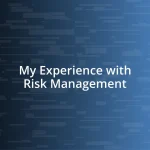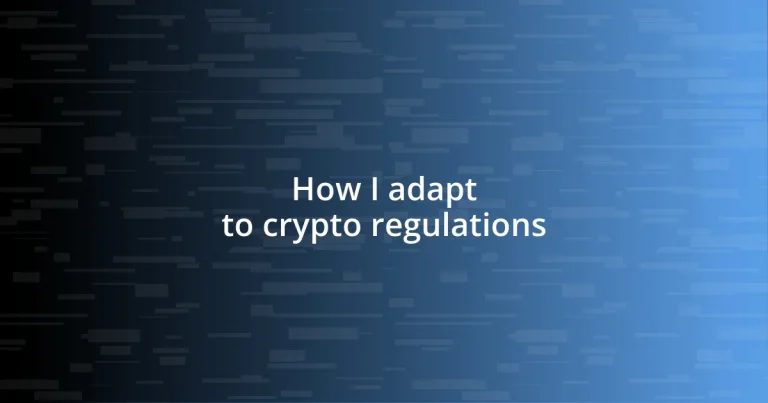Key takeaways:
- Understanding and researching local crypto regulations is essential for compliance and seizing investment opportunities in a shifting landscape.
- Building a comprehensive risk management strategy, including setting stop-loss orders and diversifying investments, is crucial for safeguarding capital in volatile markets.
- Engaging with legal experts and consistently monitoring regulatory changes are vital practices that help maintain compliance and adapt strategies effectively.
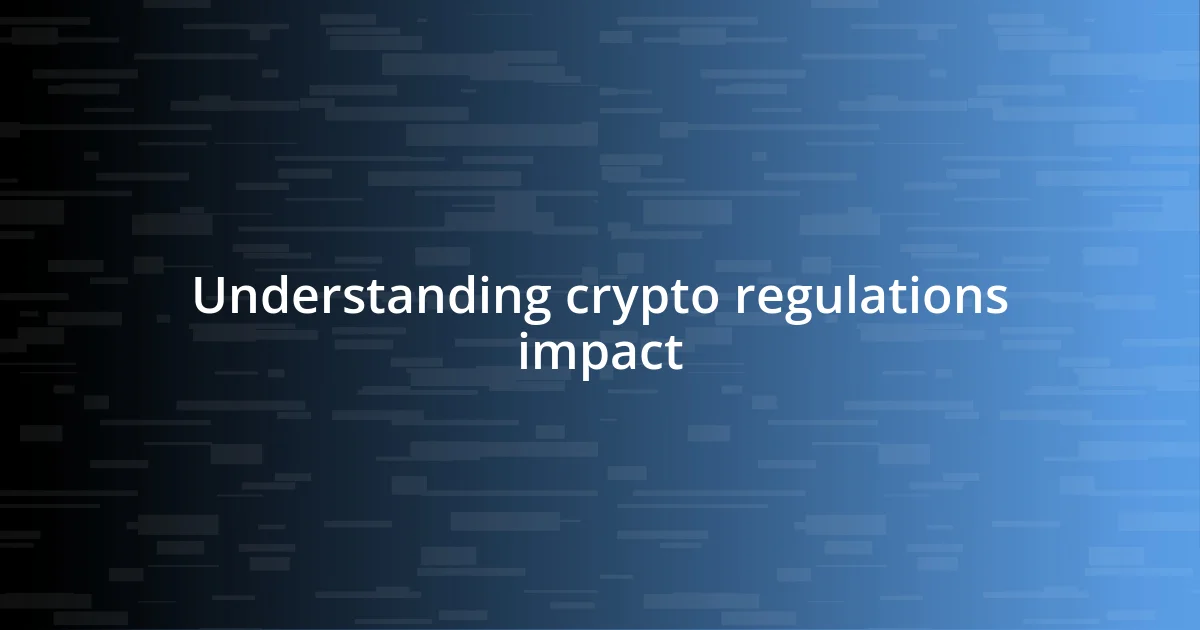
Understanding crypto regulations impact
Understanding the impact of crypto regulations is crucial for anyone involved in the industry. I remember the anxiety I felt when news broke about a potential crackdown; it’s like the ground shifts beneath your feet. How does one steady themselves in such turbulent waters?
Regulations can resonate differently depending on where you’re situated in the market. For instance, I noticed how the introduction of stricter Know Your Customer (KYC) laws influenced the onboarding process for platforms I used. I had to provide more personal information than ever before, which made me reflect on my privacy and trust in these exchanges. It raises a question for all of us: Are we willing to trade some degree of privacy for security and compliance?
The emotional weight of regulatory changes can feel like a double-edged sword. Personally, I’ve felt both a sense of reassurance and frustration; on one hand, regulation can lend legitimacy to the space, but on the other, it often stifles innovation. Have you ever felt torn between wanting a secure market and the fear that too much regulation could hinder progress? Balancing these perspectives is part of adapting to this ever-evolving landscape.
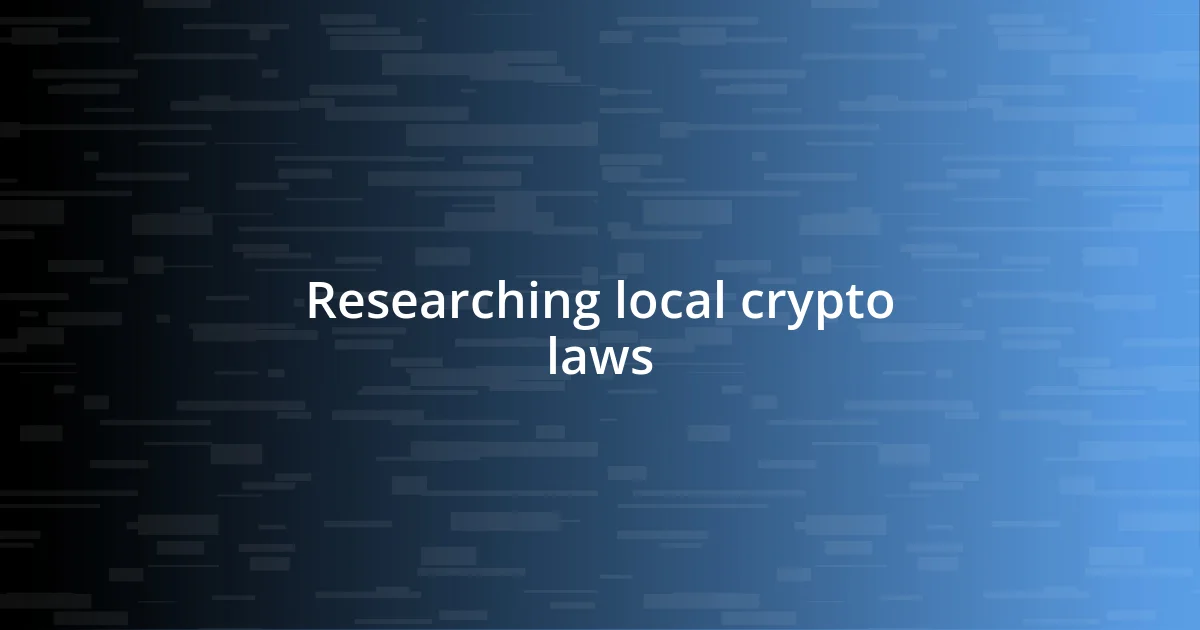
Researching local crypto laws
Researching local crypto laws has become an essential step for anyone navigating this dynamic field. When I first delved into crypto, I found it overwhelming to keep track of the ever-changing regulations. I remember poring over legal documents during late nights, trying to decipher the nuances of policy changes, just to ensure that I was compliant. It felt like learning a new language—complex but necessary.
As I explored these laws, I realized the importance of local context. In my case, discovering how different jurisdictions varied in their approach helped shape my investment strategies. For example, when I compared the regulations in my country to those of others, it became clear that understanding local legislation wasn’t just about compliance; it was also a matter of seizing opportunities. I had to adapt my strategies based on whether my jurisdiction was welcoming or restrictive toward crypto innovations. This realization drove home how crucial it is to remain informed.
Moreover, I discovered that networking with local experts greatly enriched my understanding. Sharing experiences with others in the field opened my eyes to legal loopholes I hadn’t considered. It was reassuring to have a community that shared insights and strategies, especially when regulations felt daunting. I remember attending a local meet-up where an experienced trader shared tips on navigating the legal landscape. That sense of camaraderie made me feel less isolated on my journey.
| Jurisdiction | Key Regulations |
|---|---|
| United States | Regulates through SEC and CFTC; requires compliance with federal securities laws |
| European Union | MiCA (Markets in Crypto-Assets) proposal impacts licensing and consumer protection |
| Japan | Recognizes cryptocurrencies as legal property; regulates exchanges through FSA |
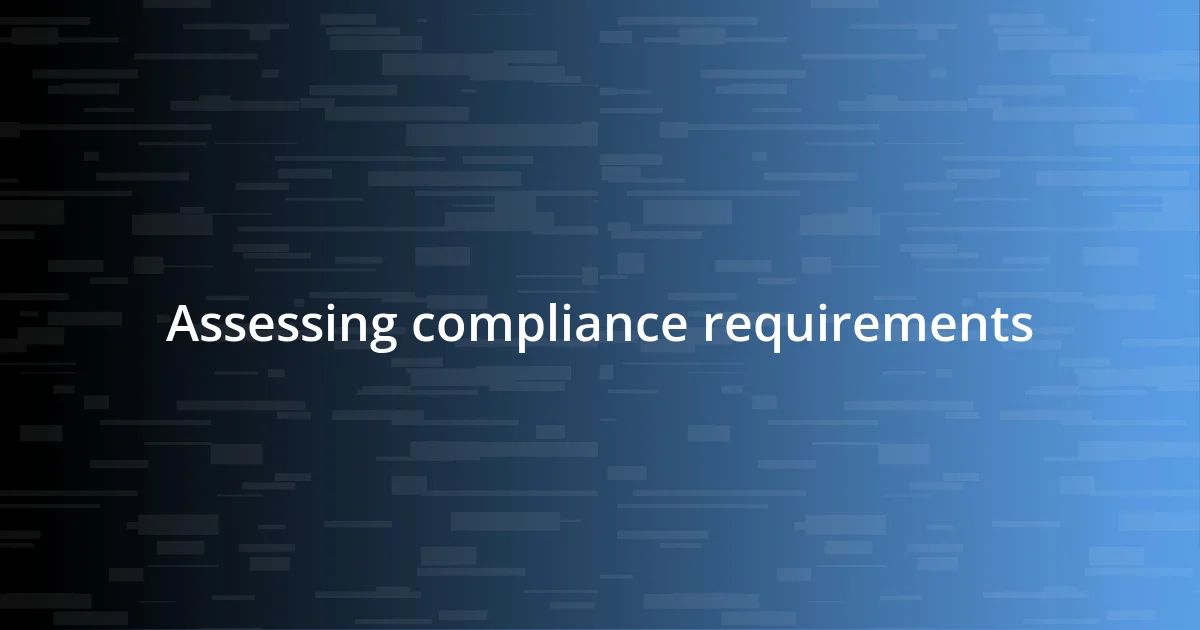
Assessing compliance requirements
Assessing compliance requirements is like piecing together a puzzle where each piece represents a different regulation. I remember attending a regulatory workshop where each speaker shared unique perspectives on compliance; it felt like a lightbulb moment for me. I realized that while the information can be overwhelming, breaking it down into manageable parts fosters clarity. Compliance isn’t just about following rules; it’s also about understanding how those rules impact my operations and strategic decisions.
Here are some key compliance requirements I’ve encountered that are essential to consider:
- Know Your Customer (KYC): Verification processes to confirm the identity of clients.
- Anti-Money Laundering (AML): Systems that detect and prevent financial crimes.
- Data Protection: Compliance with regulations like GDPR to ensure user data is safe.
- Licensing Requirements: Necessary permits depending on the jurisdiction.
- Tax Obligations: Understanding how crypto is taxed in different regions.
I’ve found that not only staying informed about these compliance requirements is vital, but also engaging with professionals in the field can provide surprising insights. For instance, during a recent discussion with a compliance officer, I learned about changes in reporting rules that I hadn’t anticipated. That conversation reassured me that being proactive rather than reactive is the key to seamlessly navigating the regulatory landscape. Each detail counts, and every interaction can lead to vital information that helps me stay compliant.
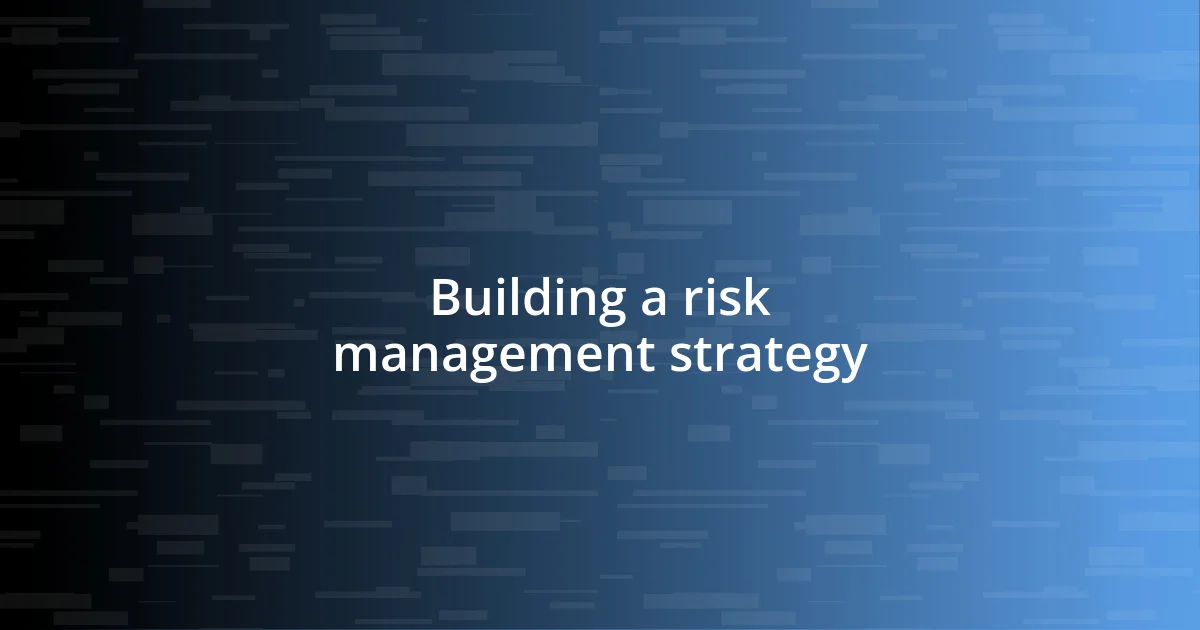
Building a risk management strategy
Building a risk management strategy in the volatile world of crypto is crucial for safeguarding your investments. I remember when I first started trading; I was overly optimistic and took unnecessary risks without any structured approach. It wasn’t until a sudden market dip wiped out a significant portion of my gains that I realized how unprepared I was. This experience motivated me to create a clear risk management plan, outlining the maximum percentage of my portfolio I was willing to risk on any single trade. It’s all about protecting your capital while still allowing room for growth.
One essential element I incorporated into my strategy is setting stop-loss orders. These are automatic sell orders that trigger when cryptocurrency prices fall to a designated level. Initially, I was hesitant to use them, worried they would limit my potential gains. However, after seeing how stop-loss orders could mitigate losses during unpredictable market fluctuations, I became a staunch advocate for them. They give me peace of mind, knowing that I can control my losses without constantly monitoring the market. Isn’t it liberating to know you have a safety net in place?
Additionally, diversifying my portfolio has proven invaluable. Instead of placing all my bets on a single coin, I spread my investments across several cryptocurrencies. I recall a time when I predominantly invested in one asset that experienced a significant downturn. Watching my investment plummet was painful, but it taught me a vital lesson about not putting all my eggs in one basket. By diversifying, I can reduce my exposure to risk while taking advantage of different market opportunities. Each aspect of this strategy contributes to a more resilient approach, and it’s rewarding to feel more secure in my decisions. How do you manage your risk?
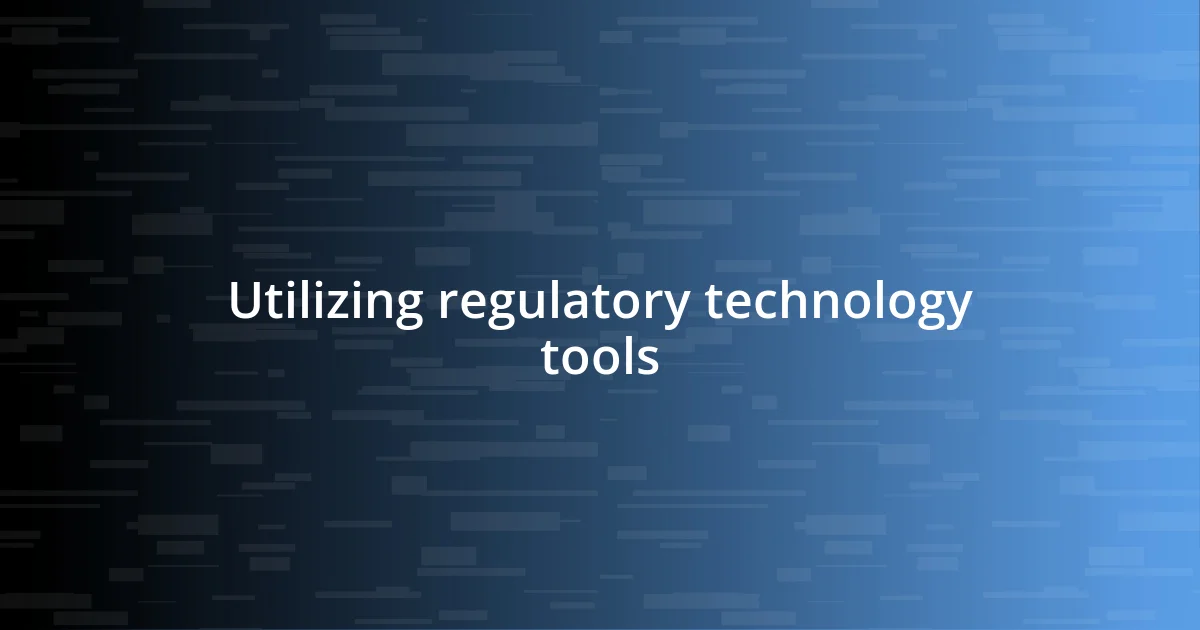
Utilizing regulatory technology tools
Utilizing regulatory technology tools has been a game changer for me in navigating the complex world of crypto compliance. I vividly recall the first time I integrated a RegTech solution into my workflow; it felt like upgrading from dial-up to high-speed internet. With automated systems that monitor transactions for suspicious activities, I’ve been able to streamline compliance checks. This efficiency not only saves me time but also helps me focus on strategic decisions rather than drowning in paperwork. Have you ever felt swamped by compliance checks?
What I find particularly impressive about these tools is their ability to adapt to changing regulations. For instance, when new AML guidelines were introduced, my compliance tool updated automatically, alerting me to the changes and how they affected my operations. Initially, I worried about the potential costs of implementing such technology, but it has become evident that the investment pays off. That peace of mind I get from knowing I am compliant is priceless. Can you put a price on confidence?
I also appreciate how regulatory technology enhances record-keeping. Using a tool that organizes transaction histories and compliance reports made audits feel less daunting. I once faced a surprise audit, and thanks to these tools, I was able to retrieve necessary documents within minutes. The relief I felt was overwhelming! In a landscape where regulations are constantly evolving, having easy access to accurate data is invaluable. Wouldn’t you agree that being prepared can save you a lot of stress?

Engaging with legal experts
Engaging with legal experts has been an eye-opening experience for me. I remember my first consultation with a lawyer specialized in cryptocurrency; I was nervous and unsure of what to expect. However, it turned out to be one of the most beneficial decisions I made. That initial discussion clarified many gray areas I had been confused about, particularly regarding tax implications and compliance obligations. Have you ever felt overwhelmed trying to decipher legal jargon?
I actively seek out relationships with professionals who truly understand the intricacies of crypto regulations. Attending workshops and webinars has not only expanded my network but also armed me with knowledge that keeps me ahead of the curve. During one particularly enlightening session, I learned about recent developments in international regulations that directly impacted my trading strategy. The chance to interact and ask questions in real time felt empowering. When was the last time you gained clarity on a topic that once baffled you?
Furthermore, I’ve found that engaging with legal experts isn’t just a one-time event; it’s an ongoing conversation. I regularly touch base with my legal advisors to ensure that I’m aligned with the latest regulatory changes. Recently, one of them alerted me about an upcoming legislative change that could potentially benefit my operations significantly. This proactive approach not only keeps me compliant but also allows me to be ahead of the game. It’s incredibly reassuring to know that I have a knowledgeable ally in my corner. Do you think having a legal partner could elevate your compliance game?
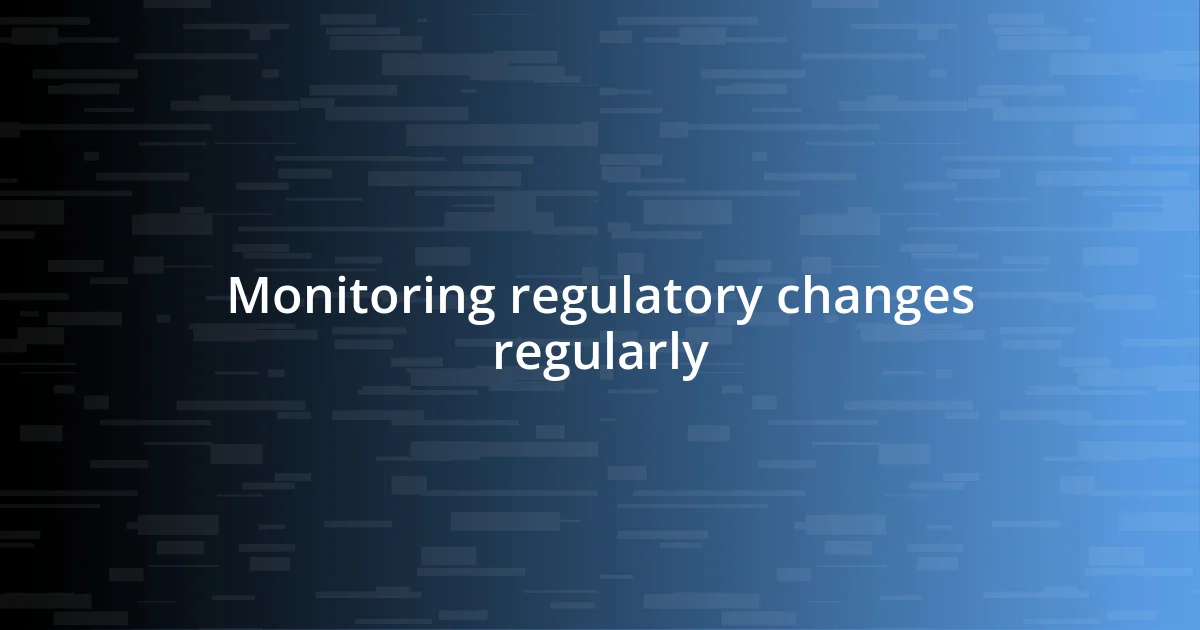
Monitoring regulatory changes regularly
Monitoring regulatory changes regularly is crucial for anyone involved in the crypto space. I make it a habit to check news outlets, regulatory bodies, and social media feeds daily. Just last month, while scrolling through my Twitter feed, I stumbled across a tweet about impending regulations that could significantly alter the market dynamics. That quick catch saved me from potential losses and highlighted the importance of staying informed.
I also utilize dedicated news aggregators that focus solely on crypto regulations. A recent notification from one of my favorite platforms alerted me to a key update in my jurisdiction—something I would have missed if I hadn’t been proactive. It reminded me of that feeling of racing against time to decipher pivotal changes. Do you remember a time when staying updated saved you from making a costly mistake?
Incorporating regulatory newsletters into my routine has also proven invaluable. Signing up for a few reputable sources has provided me with succinct summaries of changes, plus insights directly from industry experts. I once received a concise update about an upcoming compliance deadline that allowed me to prepare my operations in advance. That advance notice brought me a great sense of calm. Doesn’t it feel great to be ahead of the game rather than scrambling at the last minute?









